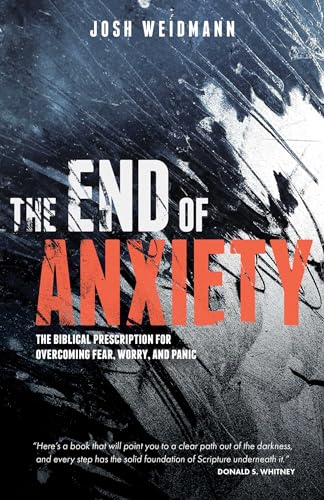
God has a purpose for all things in our lives, even anxiety. If the chief end of man is to glorify God, then we can trust that our anxiety is doing something for our good and God’s glory.
Anxiety has become a household term, a self-diagnosed disease and a permanent fixture of life in American society. It is heart-breaking to consider how common it is to struggle with anxiety, depression, fear, doubt, and worry. Anxiety presses down heavily upon the soul, dulling our senses and disabling any experience of joy or confidence. This doesn’t sound like it should be part of the life of a Believer; however, it often is. Young women of high school and college age especially seem hindered in their spiritual life (and indeed, every other area of life) by the massive obstacles of anxiety and depression, though it certainly affects both male and female alike in a variety of stages.
For many, this leads to the question, “How do I get rid of these feelings? How can I make my anxiety end?” Josh Weidmann had the same question as he struggled for years (and even still struggles at times) with severe depression and anxious thoughts. Out of his experience and out of love for those who struggle in the same way, Josh has written the book “The End of Anxiety: The Biblical Prescription for Overcoming Fear, Worry, and Panic.”
Can there really be an end to anxiety?
Josh chose the title to his book carefully. Those who struggle all want anxiety to end! But Josh has a different meaning of the word “end” in mind. In his book, “end” is meant to convey a purpose, goal, or result of something. Now consider the title again: what is the end (goal, purpose, result) of anxiety? It is the same as with every other aspect of the Believer’s life: to glorify God.
Have you considered that your fight with anxiety and depression might have a higher purpose? Josh rightly points to God and His sovereign hand over every aspect of our life. There is no other way for a Believer to think about anxiety or depression: we must look at it through the lens of Scripture and God’s perfect character.
I commend Josh for his handling of the character of God in regards to these issues – this is exactly what we need when we are walking through “the valley of the shadow of death”! And yet, I had some concerns as I read. Let’s consider these things as we discern whether this is a book to add to your library.
“Rightly handling the Word of truth . . .”
One concern in particular must be dealt with first, but let us start by reading 2 Timothy 2:15, “Do your best to present yourself to God as one approved, a worker who has no need to be ashamed, rightly handling the word of truth.” This verse is in the middle of the book of 1 Timothy, written by Paul to his “son in the faith” Timothy as an encouragement and exhortation to find the strength for his ministry in the Lord and to pursue his preaching and service to the church with courage through the Spirit rather than fear.
What does this have to do with Josh Weidmann? Unfortunately, I believe there was some mishandling of the Word of God in “The End of Anxiety”. He presented two passages in particular in a certain light that I cannot agree were accurately interpreted, therefore also skewing an accurate application of Scripture.
First, Matthew 14:22-27. This passages describes the time the disciples crossed the Sea of Galilee and ran into a storm. In the middle of their struggle on the sea, Jesus comes to them and is walking on the water. The disciples are described as being “terrified” because they assume Jesus as a ghost! Josh uses this passage to develop the potential thoughts and feelings the disciples might have had right before/during this frightening storm that they encountered. I do not believe he should have spent so much time dwelling on the feelings of the disciples. This is mere speculation to draw out what they might have been thinking or what specifically they were anxious about.
However, beyond that, I am more concerned with the fact that Josh takes the easy road of interpretation here. In other words, he fails to go beyond the surface of the passage by focusing on our stormy seas in life. He finishes the chapter with this line, “Our challenge – and opportunity – is to invite Him into our boat and let Him lead us to the solid ground of a safe harbor.” Is that really all this passage is about? Actually, it’s not. In fact, I can’t say that’s a good way to look at this passage at all. We need the full context of the verses before (and after!) to understand what’s going on here. Ultimately, this passage teaches us that Jesus is the omnipotent Son of God who deserves worship as the disciples had to learn (even though they had just witnessed Him feed the five thousand) and is not about the stormy seas of life we might experience.
Second, Matthew 27:46. This passage is the portion of Jesus crucifixion when he cries out, “My God, my God, why have you forsaken me?” This is an incredibly difficult passage to understand. Actually, I venture to say that we can’t fully understand this passage this side of eternity. Our finite minds simply can’t comprehend how Christ was indeed forsaken of God, yet not completely separated in the sense of no longer being one with the Heavenly Father. As I encountered Josh’s use of this text I had two questions. 1. Is it true to say that Jesus was actually forsaken of the Father? and 2. Does Josh use this text accurately?
The answer to #1 is yes, Christ indeed was forsaken by God. For clarification and a deeper explanation consider reading a portion of Matthew Henry’s commentary on this passage. You can also read chapter four (called The Separation) in the book “The Darkness and the Glory” by Greg Harris. Both of these resources clarified much of the theology behind this passage and helped me grasp what I could of this difficult concept.
The answer to question #2 is no, Josh does not accurately handle this passage. He concludes this chapter by saying, “That day on the cross, Jesus experienced true loneliness on the cross so that you and I wouldn’t have to.” This is a woefully inaccurate view of the importance of the cross. Perhaps Josh does not actually see the cross in so light a view; however, we must understand that this was not the purpose of the cross. Christ died on the cross for sin (including depression and anxiety) and experienced what no human being ever has or ever will experience: the full wrath of God against the sin of every predestined Believer. The suffering of Christ is way more than the physical pain of flogging and crucifixion, more than the emotional agony of seeing the grief of his mother and disciples, more than the brutal accusations and hatred of the pharisees. The suffering of Christ centered most on the wrath of God that was “pleased to crush Him” for our sin. He was not merely experiencing loneliness so we wouldn’t have to (never mind the fact that as finite humans still in our flesh, we will continue to struggle with loneliness at times).
A few other issues I had I will just mention briefly.
- He uses The Living Bible and Message “translations”
- He makes a distinction between “believing” anger and “unbelieving” anger when there shouldn’t be. Anger, unless expressed righteously as a just and holy desire to see the character of God dealt with and expressed accurately, is sin and is not characterized by belief or unbelief.
- He mentions that our anxiety can “hinder God’s work in our lives.” To clarify, we cannot hinder God’s work, we are not that powerful! However, God certainly does at times discipline us if we continue in sin, but this is not a hindrance to God’s work either because discipline is also to be considered His gracious work in our lives.
- He says he does not believe depression is a sin. This statement is unclarified at best, or completely inaccurate. I couldn’t discern if he believes depression is never a sin, or usually not sin. Clarification should be made in this instance because depression is indeed a sin – it betrays a lack of trust in God!
A few commendations . . .
While I had some major issues with Josh’s book as outlined above and some minor issues too, there were good qualities about his book that I should share.
There is an emphasis on Scripture memorization: this is a wonderful tool, especially in the context of biblical counseling (Josh himself is a biblical counselor). The Bible exhorts us to take our thoughts captive, dwell on what is true, and seek the things above not the things below. How do we do that? Only by dwelling on the character and work of Christ which we find in Scripture! I have experienced rich growth in these areas personally when I dedicate myself to the meditation and memorization of Scripture. I commend Josh for highlighting this! Josh also begins each chapter by giving a few passages to read before your go through the chapter. This is a wonderful way to center our minds on the truth in God’s word before we delve into the principles Josh presents in each chapter.
Josh also highlights the sovereignty of God. One of the greatest (and most helpful) aspects of God’s character to dwell on in difficult times and difficult emotions is His sovereign will and plan – nothing is outside of God’s control, even our anxiety or depression. This is where we can reach the conclusion that Josh does: if God is sovereign and we are made to glorify God, then we can glorify and praise Him in the midst of our depression and anxiety because He is in control!
Through the entire book, it is obvious that Josh has a heart for those who struggle with anxiety and depression. Rightly so for we are called to be people of compassion! Josh’s own personal experience also has influenced his desire to see others grow through their anxiety, even though it is a dark and difficult path. This results in a very gentle and compassionate tone throughout the book and definitely can encourage those who are weary and burdened.
To read, or not to read?
I have come to the conclusion that I cannot recommend this book for you to read.
That might seem a severe reaction after the good qualities I just highlighted; however, there were enough concerns throughout the book as highlighted above (and some more small comments or thoughts Josh had that I didn’t take the time to share) that makes discerning wise instruction in this book more difficult than it should be. There were many good points, quotes from men like Spurgeon that were greatly encouraging, and many passages of Scripture that highlight God’s character and a wise response to anxiety or depression. But inaccurate interpretation and shallow usage of Scripture is not a light concern.
If you desire to read this book for the good qualities I highlighted, I would encourage you to approach this book with prayer for discernment and an open Bible for accurate context and interpretation of certain passages. However, I honestly must recommend that you give this book a pass.
Until next time, go read a good book (like the Psalms. 🙂 )
![]()



